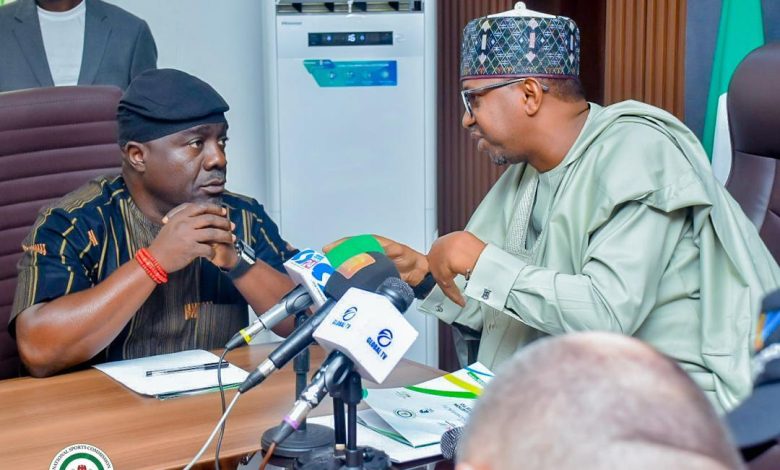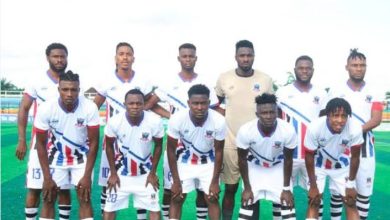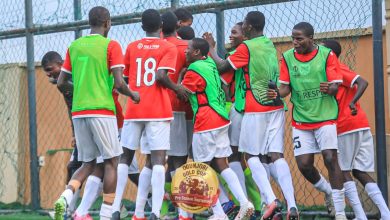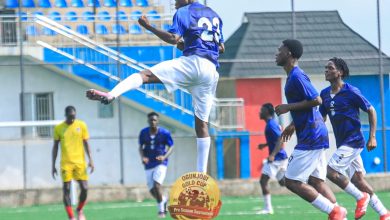NSC Marks One Year of Transformative Impact in Nigerian Sports Under Shehu Dikko’s Leadership

Exactly one year ago today, President Bola Ahmed Tinubu took a landmark decision to scrap the Federal Ministry of Sports and reorganize the National Sports Commission (NSC), making it the nation’s apex sports body.
This decision was widely applauded across the country as a much-needed turning point to harness Nigeria’s enormous sporting potential.
One year down the line, the wisdom of that decision has been validated by the remarkable achievements recorded across all layers of the nation’s sports development pyramid.
Under the dynamic leadership of Chairman Mallam Shehu Dikko and Director General Hon. Bukola Olopade, in one year, the NSC has continued to execute President Tinubu’s Renewed Hope vision for the sports sector, resulting in a commendable transformation across various sports disciplines.
One of the Commission’s landmark achievements is the “Athletes First” objective, which reinvigorated the legacy policy establishing the Elite and Podium Board. This initiative ended years of embarrassment that Nigeria often faced during major international competitions.
The Board ensures that athletes receive training grants well ahead of competitions, to aid better preparations just like their counterparts around the world. Many of Nigeria’s top athletes are already benefiting from these grants in different categories across various sports.
To further drive the “Athletes First” initiative, the NSC also established the Invited Junior Athletes (IJA) policy, which now serves as the 38th “state” at the National Sports Festival. Under IJA, the most promising young athletes in the country come together under the umbrella of IJA to complete as the 38th state during the Festival.
Earlier this year, the IJA contingent made its debut at the Gateway Games in Ogun State, yielding instant success as several junior athletes won medals and garnered necessary exposure at the national level.
The leadership of the NSC is restoring the confidence of private investors in sports, as its robust public-private partnership model has attracted over 50 billion naira into Nigeria’s sports economy.
The Commission has also institutionalized befitting corporate governance structure across sports federations through the introduction of Chief Operating Officers (COOs) to enhance professionalism and transparency. Federations of Sports such as Rugby, Badminton, E-sports, and Athletics have already adopted this model, with more sports federations set to follow after their elections.
Another major milestone is the NSC’s renewed partnership with the Ministry of Education, aimed at fully harnessing the potential of school sports from the tertiary to primary levels.
The collaboration is already revitalizing the Primary/Secondary School Games, University Games, Polytechnic Games, and Colleges of Education Games nationwide.
The NSC was also able to finally ensure that the Anti-Doping bill was passed into law, ensuring Nigeria’s commitment to clear and fair competition.
Early into its first year, the NSC launched the RHINSE Campaign—Renewed Hope for Nigeria’s Sports Economy. This bold initiative has positioned Nigeria as a preferred destination for hosting international sporting events, marking the first time in years that the country has witnessed such a vibrant sporting calendar.
The International events hosted recently include the Lagos International Badminton Tournament, International Taekwondo Championship (Abuja), Africa Arm Wrestling Tournament (Abuja), Africa Traditional Wrestling Championship (Abuja), Africa Club Volleyball Tournament (Abuja), CAA Africa U18/U20 Championships (Abeokuta), and the E1 Boat Championship (Lagos), amongst others.
In addition, the Commission has restructured and rebranded Nigeria’s premier multi-sport competition, the National Sports Festival, restoring its prestige and competitive spirit. Unlike in the past, when hosting the festival was met with uncertainty and postponements, states now eagerly bid to host the event, a clear sign of renewed confidence and enthusiasm.
The NSC has also enhanced inclusivity by increasing female representation on the governing boards of sports federations, with slots now reserved for members of the Association of Former Female Athletes of Nigeria (AFFAN).
These reforms and initiatives have translated into exceptional results across international competitions. Nigeria’s U-19 Cricket Team reached the quarter-finals of the World Cup in Malaysia for the first time ever. The Nigeria Weightlifting Federation recorded success in Mauritius, while Nigerian swimmers like Abduljabar Adama continue to make waves globally.
The success story also extends to Weightlifting, Badminton, basketball and football, with D’Tigers putting up an impressive showing in Côte d’Ivoire and the Super Falcons performing exceptionally well in Morocco – both teams ruling Africa again, emerging as continental champions this year.
Today, the Super Eagles are back in contention for World Cup qualification through the playoffs, as the NSC swiftly intervened to collaborate with relevant authorities in the quest for Nigeria’s qualification.
The creation of the Presidential Support Group, spearheaded by the Commission’s leadership has played a pivotal role in sustaining this hope.
The Commission has also raised the bar of performance for Nigeria’s special athletes with Nigeria just recently emerging the 2nd best in the world among 74 countries at the World Para powerlifting championship in Egypt.
While many more lofty feats are still yet to come, one year down the line, it has become evident, even to the most skeptical observers that Nigerian sports sector is in capable hands under the leadership of Mallam Shehu Dikko and Hon. Bukola Olopade: two visionaries committed to building legacies, empowering athletes, and establishing a sustainable sports economy fit for today and the future.





